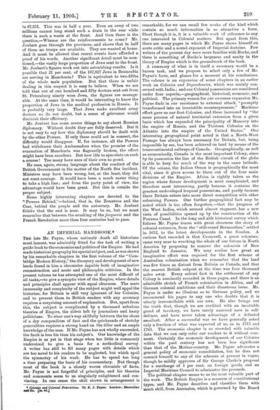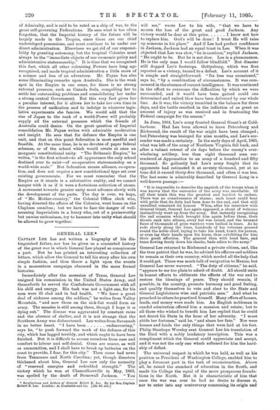THE late Mr. Payne, whose untimely death all historians must
lament, was admirably fitted for the task of writing a guide-book to the economics and politics of the Empire. He had made historical geography his special subject, and, as was shown by his remarkable chapters in the first volume of the " Cam- bridge Modern History," the discozery and development of new lands found in him a chronicler capable both of imaginative reconstruction and acute and philosophic criticism. In the present volume he has attempted one of the most difficult of all tasks,—to give a synoptic view of the Empire, where details and principles shall appear with equal clearness. The mere immensity and complexity of the subject might well appal the historian, for Britain is still very ignorant of her Colonies, and to present them to British readers with any accuracy requires a surprising amount of explanation. But, apart from this, the subject is complicated by a thousand nebulous theories of Empire, the cUbris left by journalists and hasty politicians. To steer one's way skilfully between the lee shore of a dry compendium of fact and the quicksands of sketchy generalities requires a strong band on the tiller and an ample knowledge of the seas. If Mr. Payne has not wholly succeeded, the fault is less his than his subject's. Our knowledge of the Empire is as yet in that stage when too little is commonly understood to give a basis for a methodical survey. A writer has still to fill many pages with details which are too novel to his readers to be neglected, but which spoil the symmetry of his work. He has to spend too long a time preparing the basis of his commentary. But though most of the book is a closely woven chronicle of facts, Mr. Payne is not forgetful of principles, and his theories and comments seem to us singularly enlightened and con- vincing. In one sense the skill shown in arrangement is • Colonies and Colonial Fedonstions. By IL J. Payne. London: Ileannillan and Co, Lsa, ea.)
remarkable, for we can recall few works of the kind which contain so much information in so attractive a form.
Short though it is, it is a valuable work of reference to any one interested in Colonial matters. But apart from this, there are many pages in which Mr. Payne shows himself an acute critic and a sound exponent of Imperial doctrine. Few writers of the present day were more familiar with Burke, and there is something of Burke's largeness and sanity in the theory of Empire which is the groundwork of the book.
A summary of what is in itself a summary would be a barren task, and we propose to select only a few of Mr. Payne's facts, and glance for a moment at his conclusions. The volume is an expansion of some chapters in an earlier work on Colonies and Dependencies, which was mainly con- cerned with India ; and our Colonial possessions are considered under four aspects,—geographical, historical, economic, and political. The primary reason for our overseas expansion Mr. Payne finds in our resistance to external attack, "promptly transformed into an irresistible counterpressure." Maritime effort gave us our first Colonies, and these increased by "the same process of natural territorial extension from a given basis which has expanded the principality of Muscovy into the empire of Russia, and the Thirteen Colonies on the Atlantic into the empire of the United States." One interesting geographical point noted is that a North-West Passage has always- been necessary for Britain, but, being impossible by sea, has been achieved on land by means of the transcontinental railways of Canada. Geographically, as well as economically, Canada is the most important Colony, since by its possession the line of the British circuit of the globe is able to keep for much of the way in the same latitude. Of the oceans, the Indian Ocean is geographically the most vital, since it gives access to three out of the four main divisions of the Empire. Africa is rightly taken as the region where future development is most complicated, and therefore most interesting, partly because it contains the greatest undeveloped tropical possessions, and partly because there Britain enters into more direct competition with other colonising Powers. One further geographical fact may be noted which is too often forgotten,—that the progress of the West Indies, which seemed almost stagnant, has a new vista of possibilities opened up by the construction of the Panama Canal. In the long and able historical survey which follows Mr. Payne traces with great clearness the story of colonial extension, from the " still-vexed Bermoothes," settled in 1612, to the latest developments in the Soudan. A curious fact recorded is that Cromwell, a great coloniser, came very near to wrecking the whole of our future in North America by proposing to remove the colonists of New England to Jamaica. We may realise how great an imaginative effort was required for the first scheme of Australian colonisation when we remember that the land was five times as distant from Britain as Canada, and that the nearest British outpost at the time was four thousand miles away. Every salient fact in the settlement of any Colony is succinctly recorded in these pages, and there is an admirable sketch of French colonisation in Africa, and of German colonial ambitions and their disastrous issue. Mr. Payne is under no illusions as to German policy, and we recommend his pages to any one who doubts that it is utterly irreconcilable with our own. He also brings out the truth that, though we are credited with an insatiable greed of territory, we have rarely annexed save in self- defence, and have never taken advantage of a defeated assailant. After a successful war we have generally asked only a fraction of what was expected of us, as in 1713 and 1763. The economic chapter is so crowded with valuable data that we can only refer our readers to it without com- ment. Certainly the economic development of our Colonies within the past century has not been less significant than that of the Mother-country. Mr. Payne advocates a general policy of economic consolidation, but he does not commit himself to any of the schemes at present in vogue, though he mildly approves of Sir George Clarke's proposal for a surcharge of 1 per cent. on foreign goods, and an Imperial Maritime Council to administer the proceeds.
The political chapter seems to us the most valuable part of the work. The British Empire is a museum of constitutional types, and Mr. Payne describes and classifies them with much skill, from Ascension, which is governed by the Board
a Admiralty, and is said to be rated as a ship of war, to the great self-governing Federations. He sees what is too often forgotten, that the Imperial history of the future will be largely made in the Tropics, since these are our chief undeveloped possessions, and must continue to be under our direct administration. Elsewhere we get rid of our responsi- bility by granting autonomy, but the tropical Colonies must always be the "immediate objects of our economic policy and administrative statesmanship." It is time that we recognised this fact, which all other colonising Powers have long ago recognised, and made tropical administration a little more of a science and lees of an adventure. Mr. Payne has also some illuminating remarks upon Australia. She is the weak spot in the Empire in one sense, for there is no strong external pressure, such as Canada feels, compelling her to settle her outstanding problems and consolidating her under a strong central Government. But this very fact gives her a peculiar interest, for it allows her to take her own time in the process of unification and to indulge in whatever legis- lative experiments she fancies. We would add that the rise of Japan to the rank of a world-Power will probably supply all the external pressure which the friends of Australia could desire. On the great question of Imperial consolidation Mr. Payne writes with admirable moderation and insight. He sees that for defence the Empire is one unit, and that on this point federation is most needful and feasible. At the same time, he is no devotee of paper federal schemes, or of the school which would create at once an inorganic constitutional unity. " The Britannic Empire," he writes, "is the first school—to all appearance the only school destined ever to exist—of co-operative statesmanship on a world-wide scale." But federation means alliance, co-opera- tion, and does not require a new constitutional type set over existing governments. For we must remember that the Empire as it stands is a substantive reality, and we cannot tamper with it as if it were a fortuitous collection of atoms. A movement towards greater unity must advance slowly with the development of the parts. The day is over, we hope, of " Mr. Mother-country," the Colonial Office clerk who, baring directed the affairs of the Colonies, went home on the Clapham omnibus ; but we have to face the danger of well- meaning Imperialists in a hurry who, out of a praiseworthy but unwise enthusiasm, try to hammer into unity what should be allowed to grow together.







































 Previous page
Previous page